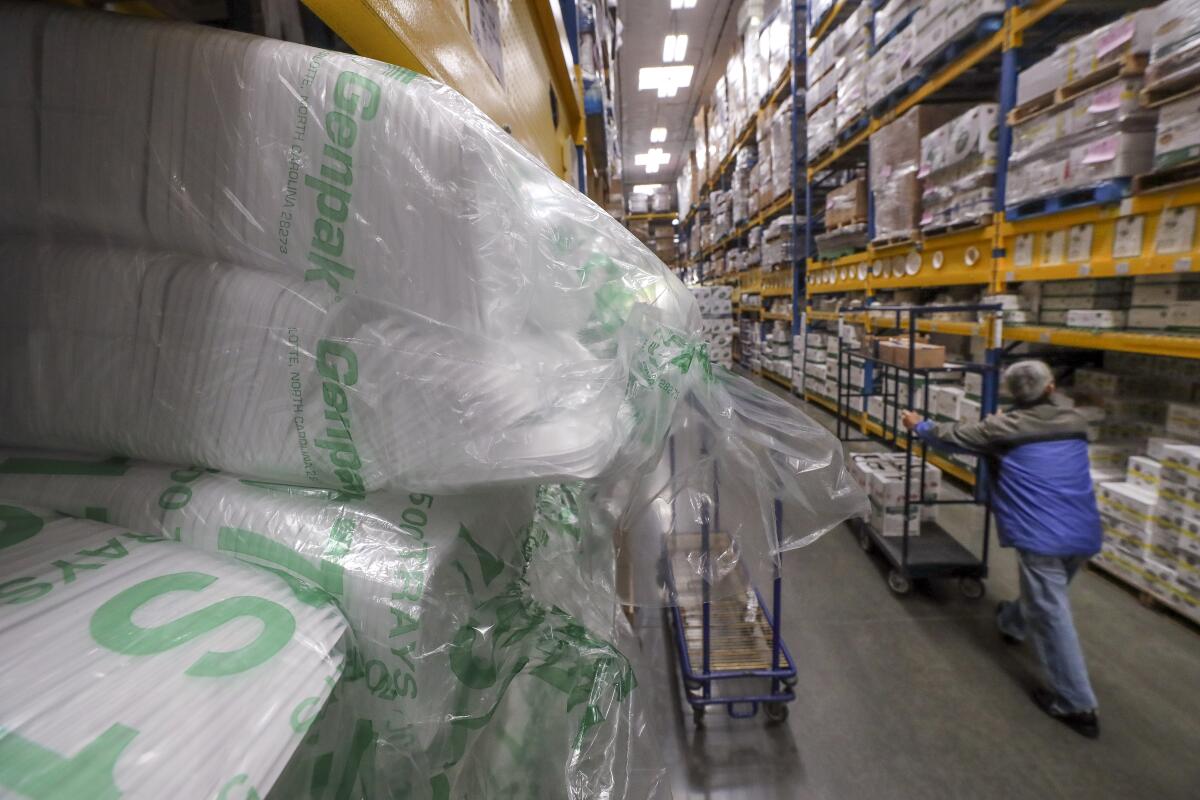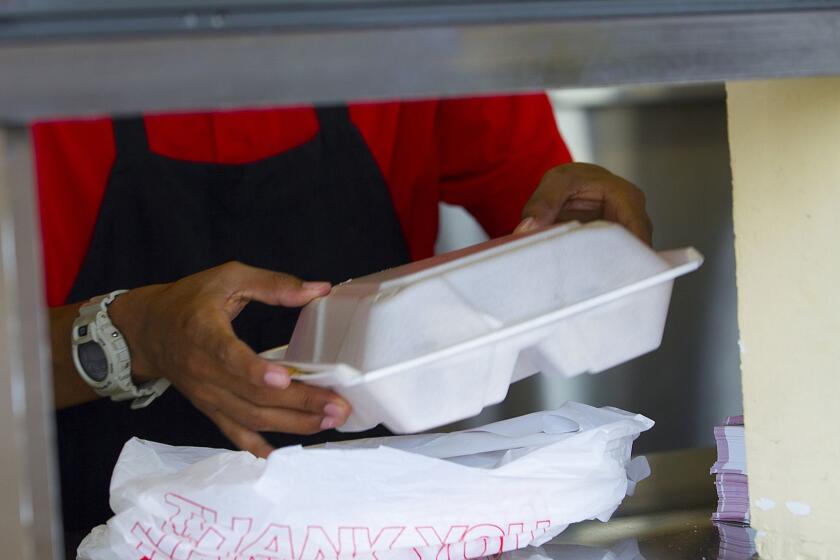San Diego halting enforcement of controversial ban on foam containers

- Share via
SAN DIEGO — San Diego has halted enforcement of its new ban on polystyrene foam products in the wake of a lawsuit filed by the restaurant industry.
City officials say they’ve decided to reverse course and conduct a thorough analysis of the ban’s effects on the environment, which the lawsuit contends the city was legally obligated to do before adopting the controversial law.
A statewide lobbying group for restaurants has filed a lawsuit seeking to block San Diego from enforcing its recently adopted ban on polystyrene foam food and beverage containers.
The city’s retreat is a setback for environmental groups that say the ban will reduce local waste that isn’t biodegradable. They also say it will keep foam products out of waterways, where they poison the food supply if eaten by fish.
Those groups said Wednesday that they still expect the law to take effect in San Diego once city officials complete the environmental analysis, which could take more than a year.
“We feel like the outcome is still going to be in favor of implementing and enforcing the ordinance,” said Michael Torti, chairman of Surfrider Foundation San Diego.
The city’s decision not to enforce the law is welcome news to many small restaurants and other businesses that use foam products, which are less expensive than paper and plastic alternatives.
While the ban was scheduled to take effect in late May, the city granted a grace period through Feb. 22 to all businesses with a gross annual income of less than $500,000 and it approved waivers for some other businesses based on various hardship claims.
The new law is forcing restaurants to change food packaging or scramble for city waivers
“This is good news for us and for lots of other small businesses,” said Reinaldo Gatica, owner of Orlando’s Taco Shop in Logan Heights, one of the plaintiffs in the lawsuit.
Gatica said he had been reluctantly preparing for his waiver to expire on Feb. 23.
A city spokesman said Wednesday that while officials granted waivers and intended to follow through with enforcement despite the lawsuit, no enforcement was actually ever conducted, despite the law taking effect.
The website of the city’s Environmental Services Department, which was tasked with enforcing the ban, has a message saying “Important Information: The city is staying enforcement of Ordinance No. 0-21030 N.S. prohibiting the distribution or use of polystyrene (also known by the trademarked name Styrofoam) within the city of San Diego pending the preparation of an Environmental Impact Report.”
City officials did not issue a news release announcing their decision to temporarily delay enforcement of the ban.
The restaurant association declined to comment Wednesday through a spokeswoman.
Nearly all national and regional restaurant chains long ago stopped using polystyrene in response to lobbying from environmental groups and backlash from customers concerned that foam isn’t biodegradable.
But many taco shops, pizza parlors, convenience stores and other small businesses continue to use foam products to save money.
The ban would make it illegal to sell or distribute egg cartons, cups and food containers made in whole or in part from polystyrene foam, often called by the brand name Styrofoam.
That includes bowls, plates, trays, lids and other items designed for one-time use for prepared foods, including containers for dine-in food, takeout and leftovers to take home.
In addition to restaurant food and beverage containers, the ban would apply to polystyrene egg cartons, coolers, ice chests, pool toys, dock floats and mooring buoys.
The law also would make it illegal to distribute plastic utensils or straws unless requested by customers.
San Diego’s decision to retreat and conduct an environmental impact report could affect 120 other California cities and counties that have adopted bans on polystyrene products in recent years.
None of those cities conducted thorough environmental analyses — called Environmental Impact Reports (EIR) under state law. San Diego, the largest city in the state to adopt a ban, was also the first to face a lawsuit for not doing an EIR.
“This case sets a precedent,” Torti said.
He said, however, that advocates for polystyrene bans have already established through previous studies that the laws have environmental benefits for communities.
“The evidence is overwhelming — that’s why we brought this forward in the first place,” Torti said. “The specific plastics that this ordinance is set to ban are some of the most common single-use plastics that we find at our beach clean-ups and throughout the community.”
The industry lawsuit says that the products that typically replace polystyrene could be worse for the environment.
“Evidence before the city when it adopted the ordinance uniformly showed that a ban on expanded polystyrene, which is recyclable, will not reduce litter or trash and will result in polystyrene foam being substituted with replacement products that have far greater environmental impacts and result in increased litter and trash,” the lawsuit says.
Before San Diego approved the ban in January, attorneys for the city said an EIR was not required “because it can be seen with certainty that there is no possibility that the proposed ordinance would have a significant adverse effect on the environment.”
City documents also asserted that San Diego is exempt from such an analysis because the ban is “an action of a regulatory agency for the ‘maintenance, restoration, enhancement and protection of the environment.’”
When the lawsuit was filed in March, city officials said they were moving forward with the ban despite the litigation.
The city spokesman, Jose Ysea, declined to say why officials decided to reverse course, citing ongoing litigation as the reason he couldn’t explain.
Councilman Chris Ward, who spearheaded the ban, said Wednesday he couldn’t comment on the litigation but, he said, having a ban in place is critically important.
“Until plastic waste is removed from the system, plastic pollution will continue to threaten our beaches, rivers and canyons, putting the health of San Diegans and our marine ecosystem at risk,” Ward said by email.
In San Diego county, the other cities with polystyrene bans are Encinitas, Solana Beach, Del Mar and Imperial Beach.
More to Read
Sign up for Essential California
The most important California stories and recommendations in your inbox every morning.
You may occasionally receive promotional content from the Los Angeles Times.















